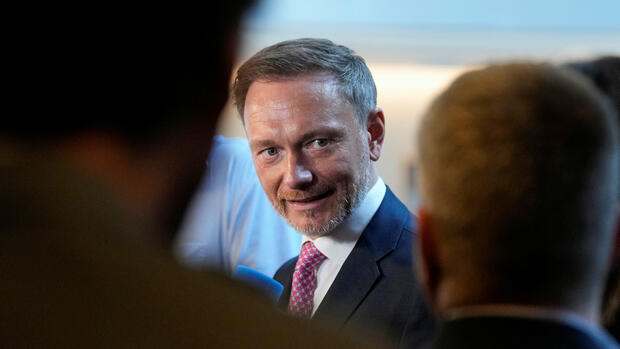The Federal Minister of Finance regularly pleads for thrift at traffic lights.
(Photo: Reuters)
Berlin, Washington At meetings of the International Monetary Fund (IMF), German finance ministers often have to listen to criticism. Germany has been accused of saving too much and investing too little in recent years. But at the current spring meeting, the mood is different.
Federal Finance Minister Christian Lindner (FDP) will be pleased to hear the IMF’s recommendations. The FDP boss can feel confirmed in his course.
In fact, the IMF has changed its recommendations. Instead of supporting the economy with spending programs as in the pandemic, the IMF is now calling for more financial restraint in view of the high inflation. The Washington experts argue that monetary and financial policy should work hand in hand. Otherwise, governments would thwart central bank efforts to bring inflation under control.
Lindner has repeatedly argued similarly in recent months when he warned the traffic light coalition to be economical. It’s no wonder that the Finance Minister is happily taking up the recommendations of the Monetary Fund: “You should take this advice very seriously,” he emphasized.
For Lindner, the advice comes at the right time. For weeks he has been arguing with his cabinet colleagues about the budget draft for the coming year. The other ministries are demanding an additional 70 billion euros – money that the finance minister does not have, as he wants to comply with the debt brake.
The negotiations about the money are so bogged down within the government that Lindner has indefinitely postponed the submission of the key budget figures. These benchmarks are a first rough draft that determines how much money each ministry gets. It is now foreseeable that he will no longer submit it, but will continue to negotiate until the complete draft budget is ready in June.
IMF calls for investments
Lindner uses the meantime to point out to his cabinet colleagues at every opportunity that there is no leeway in the budget. More debt or tax increases to finance new spending programs are out of the question for the FDP leader. Lindner emphasized in Washington that the time of pure distribution policy in Germany is over. “We now have to invest again, renew, initiate structural reforms,” he said.
>> Read here: The big tax dispute – who in Germany is really being attacked by the tax authorities
Despite all the calls for consolidation, the IMF is also continuing to call for investments, for example in green technologies and training programs. Germany in particular has enough financial leeway for this in the medium term, it said in Washington.
The investments could also help to support the economy. The IMF has just presented its new economic forecast, according to which Germany is at the bottom. The IMF economists expect the gross domestic product (GDP) to fall by 0.1 percent in the current year.
The IMF is relatively pessimistic about the prospects for the German economy.
(Photo: AP)
“Germany is not growing as strongly, Germany is not developing as well as others,” warned Lindner. However, he believes that forecasting a recession is too pessimistic. “That does not match the expectations that we have with regard to the growth prospects of the German economy.”
>> Read here: Lindner threatens ministries with cuts because of billions gap
At the beginning of April, the leading German research institutes had predicted mini-growth in gross domestic product of 0.3 percent. At the end of the month, the federal government will present its new forecast. It is likely to range between the forecasts of the IMF and the German institutes.
The Federal Minister of Finance sees the weak economy as an argument for his call for a supply-oriented financial and economic policy. A year ago he had submitted a corresponding paper. Instead of government support programs, it relies on structural improvements in site conditions. “We have to do much more to improve the competitive conditions in our economy,” said Lindner.
For the FDP boss, this includes better immigration opportunities for qualified employees and more investment in education, as well as “impulses about tax law”. The Minister of Finance has at least selective relief for companies in mind. However, the SPD and the Greens take a critical view of this, especially when Lindner emphasizes at the same time that there is no money in the budget.
More: Christian Lindner wants to give start-ups massive tax relief
